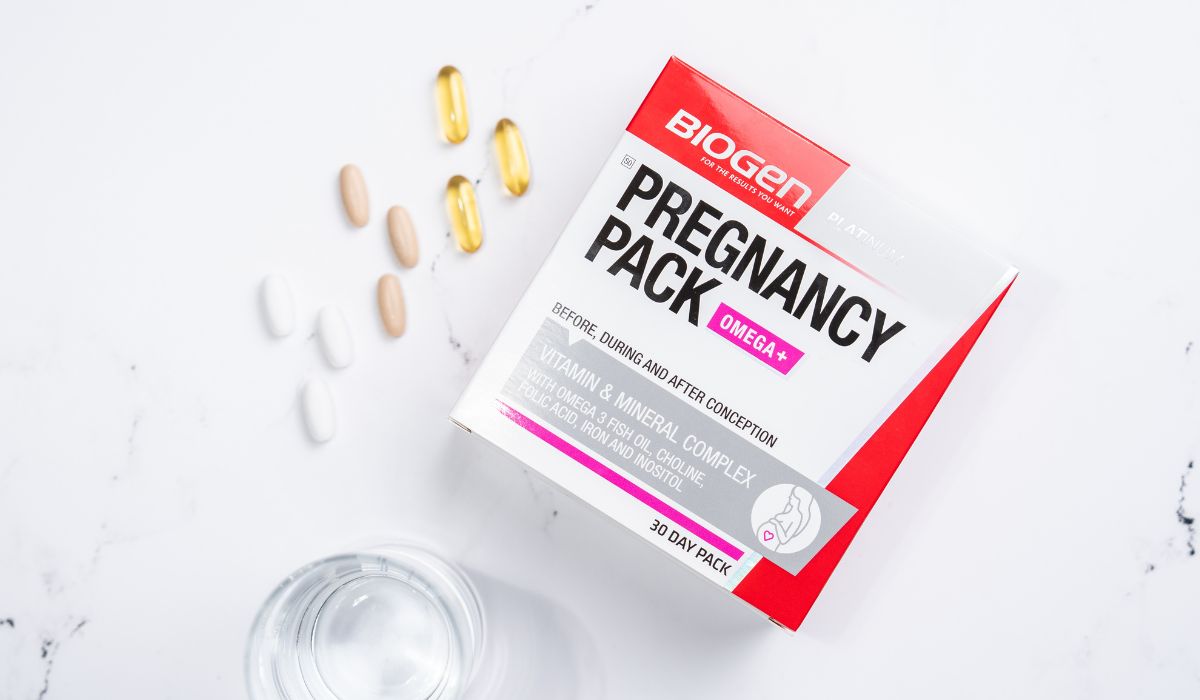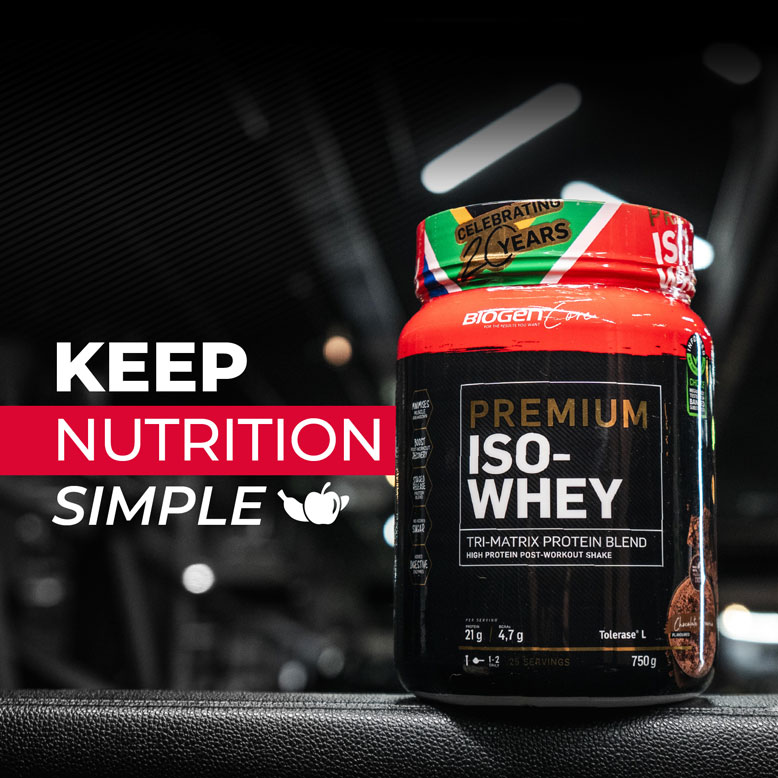
Pregnancy is a wondrous time for every expectant mother and their partner, and the best way to support and nurture new life is with optimal nutrition and a focus on overall health.
Creating a healthy environment for your growing baby requires a wholesome diet and regular activity.
Eating a balanced and nutritious diet is vital to meet baby’s developmental needs while supporting the mom-to-be with the energy and vitality needed to support new life.
Prenatal supplement support
A quality supplement like Biogen Pregnancy Pack Omega+ can offer added nutritional support at this critical period in both their lives.
This comprehensive prenatal supplement helps support your wholefood diet, helping you meet a portion of your daily nutritional requirements during pregnancy in a convenient, easy-to-take dose.
Biogen Pregnancy Pack Omega+ is a vitamin and mineral complex formulated for use before, during and after conception for added nutritional support. Available in a 30-day pack, each serving consists of three components:
- 1 multivitamin and mineral tablet
- 1 calcium tablet
- 1 omega 3 soft gelatine capsule
Each multivitamin and mineral tablet contains B-vitamins, vitamins A, C and E, folic acid, biotin, Inositol, iron, zinc, copper, and choline. Every calcium tablet includes calcium (from calcium carbonate), magnesium, vitamin D3, and vitamin K2, while each omega 3 soft gelatine capsule contains essential fatty acids (EFA) from fish oil, including docosahexaenoic acid (DHA) and eicosapentaenoic acid (EPA).
Each of these micronutrients fulfils a specific role in supporting a healthy pregnancy:
The best approach is to consult your doctor or OBGYN to devise a personalised nutritional plan that includes appropriate supplements where required. This will ensure both you and your baby receive the essential nutrients needed for a healthy pregnancy and beyond.
References:
- Institute of Medicine (US) Committee on Nutritional Status During Pregnancy and Lactation. Nutrition During Pregnancy: Part I Weight Gain: Part II Nutrient Supplements. Washington (DC): National Academies Press (US); 1990. 17, Vitamins A, E, and K. Available from: https://www.ncbi.nlm.nih.gov/books/NBK235251.
- Ali MA, Hafez HA, Kamel MA, Ghamry HI, Shukry M, Farag MA. Dietary Vitamin B Complex: Orchestration in Human Nutrition throughout Life with Sex Differences. Nutrients. 2022 Sep 22;14(19):3940. doi: 10.3390/nu14193940. PMID: 36235591; PMCID: PMC9573099
- Ryusuke Takechi, Ayumi Taniguchi, Shuhei Ebara, Toru Fukui, Toshiaki Watanabe, Biotin Deficiency Affects the Proliferation of Human Embryonic Palatal Mesenchymal Cells in Culture12, The Journal of Nutrition, Volume 138, Issue 4, 2008, Pages 680-684, ISSN 0022-3166,
https://doi.org/10.1093/jn/138.4.680. - Greenberg JA, Bell SJ, Guan Y, Yu YH. Folic Acid supplementation and pregnancy: more than just neural tube defect prevention. Rev Obstet Gynecol. 2011 Summer;4(2):52-9. PMID: 22102928; PMCID: PMC3218540.
- Gallo S, McDermid JM, Al-Nimr RI, Hakeem R, Moreschi JM, Pari-Keener M, Stahnke B, Papoutsakis C, Handu D, Cheng FW. Vitamin D Supplementation during Pregnancy: An Evidence Analysis Center Systematic Review and Meta-Analysis. J Acad Nutr Diet. 2020 May;120(5):898-924.e4. doi: 10.1016/j.jand.2019.07.002. Epub 2019 Oct 25. PMID: 31669079
- Ota E, Mori R, Middleton P, Tobe-Gai R, Mahomed K, Miyazaki C, Bhutta ZA. Zinc supplementation for improving pregnancy and infant outcome. Cochrane Database Syst Rev. 2015 Feb 2;2015(2):CD000230. doi: 10.1002/14651858.CD000230.pub5. Update in: Cochrane Database Syst Rev. 2021 Mar 16;3:CD000230. doi: 10.1002/14651858.CD000230.pub6. PMID: 25927101; PMCID: PMC7043363.
- Grzeszczak K, Kwiatkowski S, Kosik-Bogacka D. The Role of Fe, Zn, and Cu in Pregnancy. Biomolecules. 2020 Aug 12;10(8):1176. doi: 10.3390/biom10081176. PMID: 32806787; PMCID: PMC7463674.
- Jaiswal A, Dewani D, Reddy LS, Patel A. Choline Supplementation in Pregnancy: Current Evidence and Implications. Cureus. 2023 Nov 8;15(11):e48538. doi: 10.7759/cureus.48538. PMID: 38074049; PMCID: PMC10709661.
- Delshad H, Raeisi A, Abdollahi Z, Tohidi M, Hedayati M, Mirmiran P, Nobakht F, Azizi F. Iodine supplementation for pregnant women: a cross-sectional national interventional study. J Endocrinol Invest. 2021 Oct;44(10):2307-2314. doi: 10.1007/s40618-021-01538-z. Epub 2021 Mar 11. PMID: 33704696.
- Hofmeyr GJ, Lawrie TA, Atallah ÁN, Torloni MR. Calcium supplementation during pregnancy for preventing hypertensive disorders and related problems. Cochrane Database Syst Rev. 2018 Oct 1;10(10):CD001059. doi: 10.1002/14651858.CD001059.pub5. PMID: 30277579; PMCID: PMC6517256.
- Dalton LM, Ní Fhloinn DM, Gaydadzhieva GT, Mazurkiewicz OM, Leeson H, Wright CP. Magnesium in pregnancy. Nutr Rev. 2016 Sep;74(9):549-57. doi: 10.1093/nutrit/nuw018. Epub 2016 Jul 21. PMID: 27445320.
- Coletta JM, Bell SJ, Roman AS. Omega-3 Fatty acids and pregnancy. Rev Obstet Gynecol. 2010 Fall;3(4):163-71. PMID: 21364848; PMCID: PMC3046737.










